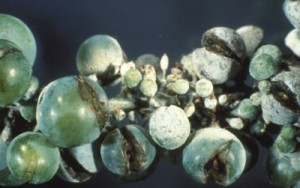Last month’s grape riots threatened to split Wieta, the ethical trading initiative, worse than a Swartland grape with powdery mildew (below). And things just got worse. Yesterday Wieta board member and WOSA CEO Su Birch tweeted “WOSA is not anti-bulk” yet in August, Wieta board member Patricia Dyata, general secretary of women-led farm worker union Sikhula Sonke, told the Guardian bulk exports were squeezing farmers.
“The farmers aren’t getting more income. The wine is made on this side and the exporters decide the price, not the farmers. So the profits decrease and it does impact on the workers. If we go to negotiate it becomes hard for the salary to increase beyond the minimum wage. If the exporters were willing to pay more, the farmers could pay more and keep people in permanent jobs with benefits.” Patricia was flagging bulk exports as an issue which later contributed to the tragic grape riots less than three months later. Pity nobody was paying attention.
Su is supported by WOSA chair Johann Krige who notes “the WOSA board fully underwrite our CEO’s tweet. Certain of the larger exporters are fastidious in their approach to export only in bulk whilst others are playing other strategies. The mere fact that South African exports reached an all-time record yoy end November (418m litres) is worth so much more than the issue under contention!
The view of the WOSA Board is that the trend to bulk wine is a structural change that is occurring in the global wine industry and not unique to South Africa. According to Rabobank, and I quote from their industry note #296 of January 2012: ‘Over the past decade wine exports from the major New World wine producing countries in bulk format have grown from approximately one fifth to nearly one-half of all wine volumes traded.’
This trend has affected Australia, Chile, Argentina and more recently South Africa and New Zealand. Many South Africa brands, as well as Own Label South African brands, are selling good quality wine, yet in order to be sold at competitive price points are bottled abroad. The WOSA Board regrets the loss of jobs at bottling facilities and dry goods manufacturers, but as an industry, we have to respond to global trends. The positive is that close on 90 % of all bulk wines that are exported are “certified” which at least assist in building Brand South Africa. Strategically we are increasing our investment into markets such as USA, Canada, Africa and Asia, where we believe there is an opportunity to sell more South African bottled wine at higher prices.”
So will bulk exports lead to a split between WOSA and Wieta? If so, this will surely herald the end of Wieta as Su “has been involved with WIETA since its inception and has been an Exco member from the start, with only a one-year break. WOSA was instrumental in arranging the initial funding for the establishment of WIETA from the WOSA UK Importers Committee CCT Fund.” According to the Wieta website.
How ironic then that UK importers, who were responsible for starting Wieta, now look like they’ll be the ones to pull the plug as producers switch to labour efficient bulk exports in order to compete in the UK.




